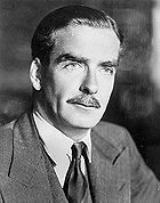
, MC
, PC
(12 June 1897 – 14 January 1977) was a British Conservative
politician, who was Prime Minister
from 1955 to 1957. He was also Foreign Secretary
for three periods between 1935 and 1955, including during the Second World War.
In the post-war years, Eden was a protagonist of the change in British policy on war criminal trials, which was perhaps best symbolised by his signature under the pardon conceded to the German Field Marshal Albert Kesselring
on 24 October 1952.
Eden's worldwide reputation as an opponent of appeasement
, a "Man of Peace", and a skilled diplomat was overshadowed in the second year of his premiership when the United States refused to support the Anglo-French military response to the Suez Crisis
, which critics across party lines regarded as an historic setback for British foreign policy
, signalling the end of British predominance in the Middle East.
He is generally ranked among the least successful British Prime Ministers of the twentieth century, although two broadly sympathetic biographies (in 1986 and 2003) have gone some way to redressing the balance of opinion.
Our quarrel is not with Egypt, still less with the Arab world. It is with Gamal Abdel Nasser|Colonel Nasser. He has shown that he is not a man who can be trusted to keep an agreement. Now he has torn up all his country's promises to the Suez Canal Company and has even gone back on his own statements.![]()
We cannot agree that an act of plunder which threatens the livelihood of many nations should be allowed to succeed.![]()
There is now doubt in our minds that Nasser, whether he likes it or not, is now effectively in Russian hands, just as Mussolini was in Hitler's. It would be as ineffective to show weakness to Nasser now in order to placate him as it was to show weakness to Mussolini.![]()
All my life, I've been a man of peace, working for peace, striving for peace, negotiating for peace. I've been a League of Nations man and a United Nations man and I'm still the same man with the same convictions, the same devotion to peace. I couldn't be other even if I wished. But I'm utterly convinced that the action we have taken is right.![]()
If we had allowed things to drift, everything would have gone from bad to worse. Nasser would have become a kind of Moslem Mussolini, and our friends in Iraq, Jordan, Saudi Arabia, and even Iran would gradually have been brought down. His efforts would have spread westwards, and Libya and North Africa would have been brought under his control.![]()
It has had the effect of making us the 49th state [of America].![]()
Although [in 1937] we might still hope to prevent the divisions of Europe into Fascist and anti-Fascist camps, our real affinities and interests, strategic as well as political, lay with France, a fact which some of my colleagues were most reluctant to realise.![]()

